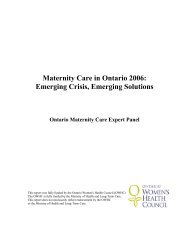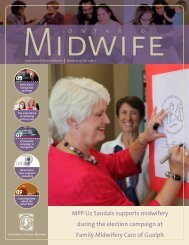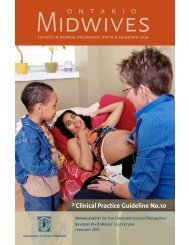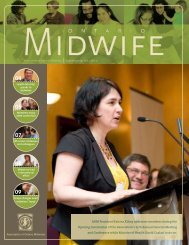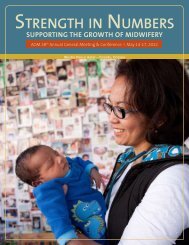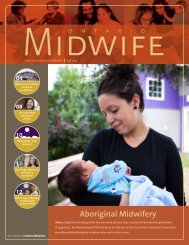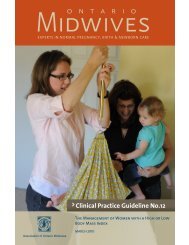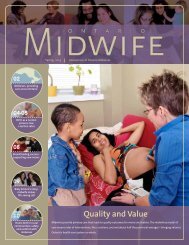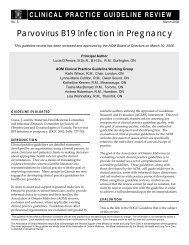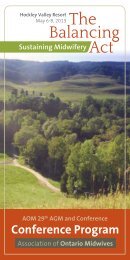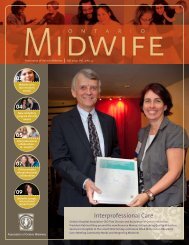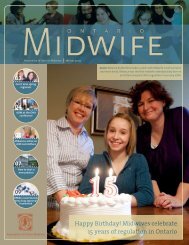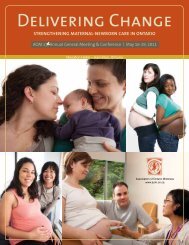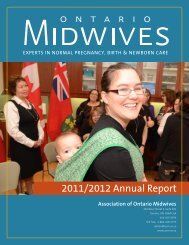Association of Ontario Midwives Summer 2012
Association of Ontario Midwives Summer 2012
Association of Ontario Midwives Summer 2012
You also want an ePaper? Increase the reach of your titles
YUMPU automatically turns print PDFs into web optimized ePapers that Google loves.
Rural and Remote Practice<br />
Locum Program fosters sustainability and growth <strong>of</strong> rural and remote practice<br />
In many rural, remote and northern<br />
communities, midwifery care is<br />
provided by a solo midwife or by<br />
a small practice. Rural and remote<br />
midwives accept the challenges <strong>of</strong><br />
working in smaller and sometimes<br />
isolated communities, and the<br />
additional strain <strong>of</strong> being completely<br />
tied to their work. Unlike midwives in<br />
larger midwifery practice groups, they<br />
can’t rely on their colleagues to access<br />
time <strong>of</strong>f-call. The Locum Program<br />
provides much needed vacation and<br />
emergency relief for rural and remote<br />
midwives, allowing them to recharge<br />
and relax or to tend to pressing<br />
personal matters. This in turn helps<br />
midwifery to remain strong in small<br />
communities.<br />
In 2009, the AOM introduced a<br />
program to respond to the needs<br />
<strong>of</strong> rural and remote midwives with<br />
funding from the Ministry <strong>of</strong> Health<br />
and Long-Term Care. The AOM Rural<br />
and Remote Locum Program provides<br />
relief for midwives for holidays,<br />
illness, emergencies, continuing<br />
education or parental leave. It<br />
enables midwives to turn <strong>of</strong>f their<br />
pagers with the confidence that their<br />
clients are in the experienced hands<br />
<strong>of</strong> another midwife.<br />
For Natalie Kirby, who usually<br />
works at <strong>Midwives</strong> Nottawasaga in<br />
Collingwood, a locum placement<br />
allowed her to support a solo midwife<br />
in Powassan, near Kirby’s hometown<br />
<strong>of</strong> North Bay. While on locum, Kirby<br />
gained insight into the life <strong>of</strong> a solo<br />
midwife when she was on call for 28<br />
days in a row. During her second week<br />
she attended four births, three in<br />
hospital and one at home.<br />
“Being a solo midwife is an incredible<br />
responsibility,” says Kirby. She says<br />
being able to provide relief to the<br />
local midwife and provide care to her<br />
clients was very rewarding. “Balance<br />
is essential in our career. You need<br />
time to be pager-free so you can sleep,<br />
travel or do whatever you need to do.”<br />
She was also happy to ensure that<br />
clients had the birth experiences<br />
they were seeking. “If a locum didn’t<br />
come, the women might have been<br />
transferred out <strong>of</strong> midwifery care<br />
and wouldn’t have<br />
had home visits,”<br />
says Kirby.<br />
Susan Wilts, a<br />
solo midwife at<br />
Huron Community<br />
Midwifery Services<br />
in Auburn, uses her<br />
time <strong>of</strong>f to volunteer<br />
with a medical team<br />
in Haiti. For the past<br />
four years, the Locum<br />
Program has enabled<br />
midwife Maggie<br />
Fioravanti to care<br />
for Susan’s clients<br />
while she is away.<br />
Wilts says Fioravanti<br />
(who retired from St.<br />
Jacobs <strong>Midwives</strong> in 2008) is the ideal<br />
person to relieve her because she has<br />
extensive experience with Old Order<br />
Amish and Mennonite women, who<br />
make up 80 percent <strong>of</strong> Wilts’s practice.<br />
According to Wilts, Fioravanti also<br />
has the sense <strong>of</strong> adventure needed to<br />
navigate southwest Bruce County in<br />
the middle <strong>of</strong> winter. Many <strong>of</strong> Wilts’s<br />
clients live on rural roads that don’t<br />
appear on maps and aren’t plowed<br />
between 9:30 p.m. and 4:30 a.m. –<br />
even if there’s been a snowstorm. Her<br />
clients don’t have telephones and<br />
Top and above: Collingwood midwife Natalie Kirby provided <strong>of</strong>f-call relief for<br />
a solo midwife in northern <strong>Ontario</strong> during a locum placement in Powassan,<br />
near Kirby’s hometown <strong>of</strong> North Bay. She was on call for 28 days straight and<br />
attended four births in one week.<br />
there is limited cell phone service in<br />
the area. Babies are <strong>of</strong>ten delivered by<br />
lantern light and using the bathroom<br />
means a cold walk to the outhouse.<br />
“A midwife (working in this area)<br />
definitely has to have a good vehicle,<br />
warm clothes and boots, and a GPS,”<br />
says Wilts.<br />
As midwifery in <strong>Ontario</strong> grows with<br />
more practices in rural and remote<br />
areas <strong>of</strong> the province, the AOM Locum<br />
Program will continue to support<br />
midwives and sustain midwifery care<br />
in these communities.<br />
To find out more about the Rural and Remote Locum Program,<br />
please contact the AOM at 416-425-9974 or 1-866-418-3773 x2257.<br />
10<br />
ontario midwife • <strong>Summer</strong> <strong>2012</strong>



